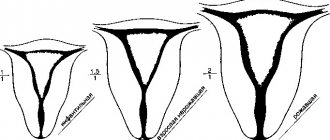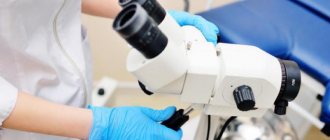If a couple is planning to have a baby, it will be useful for them to know when a woman ovulates and what days are the best for getting pregnant.
To avoid unplanned pregnancy, it is also important to track your fertile window—the most favorable time in a woman's cycle to conceive. The fertile window is the most favorable period for conception. “Fertile window” or when the possibility of conception is maximum. The chance of pregnancy is greatest during the 3-6 day interval ending on the day of ovulation, especially the day before ovulation (the so-called “fertile window”).
An egg ready for fertilization is released from the ovary within 1-2 days after ovulation. It is during this period that a woman’s body is most predisposed to pregnancy. However, you can get pregnant in the previous few days. Spermatozoa retain their motility for 3-5 days. This ability allows male reproductive cells to wait for the release of the egg from the ovary if they entered the uterine cavity before this time.
Menstrual cycle
The fertile window is directly related to the timing of ovulation. The average length of a woman's menstrual cycle is from 28 to 32 days. Some people have shorter cycles, while others have longer cycles.
The first day of menstruation (menstruation, regula) gives the countdown to the menstrual cycle, and is considered its first day. Usually menstruation lasts 3-7 days.
The entire menstrual cycle is divided into two phases:
- the first phase is follicular. It starts from the first day of menstruation. In the first phase, the follicle develops, from which the egg must then be released. The follicular phase ends with ovulation;
- the second phase is the luteal phase. In place of the egg that has already left the ovary, a corpus luteum appears. This structure is responsible for the balance of hormones. They are produced and secreted to prepare the body for the changes that a possible pregnancy will bring. The phase lasts until the start of regulation.
Next, the menstrual phase begins. There is a rejection of the functional layer of the uterus, which was prepared for the possible implantation of a fertilized egg. This is why bleeding from the uterine cavity occurs.
Best emergency contraception methods
Among the folk recipes on how to avoid getting pregnant at home, one can highlight vaginal douching. The purpose of the washing procedure is to remove all missing male biomaterial. Of course, complete removal of ejaculate cannot be achieved, but the likelihood of conception is reduced. To enhance the effect, you need to prepare an acidic composition by adding table vinegar or lemon juice to the water - sperm die faster in an acidic environment. Douching should be done immediately after unprotected sex.
In gynecology, you have at your disposal two means of emergency contraception, approved by the World Health Organization and which will help you not get pregnant if the situation is unambiguous:
- Intrauterine device (IUD). It effectively prevents pregnancy if inserted into the uterus no later than 5 to 7 days after unprotected intercourse.
- Emergency contraceptive pills "72 hours". According to experts, tablets containing mifepristone as an active substance are effective and safe. When using them, the risk of side effects is minimal. Typically, emergency contraceptive medications are designed to be taken no later than 72 hours (3 days) and up to 120 hours (5 days) after intimate communication that is questionable regarding the possibility of pregnancy. The effectiveness of such emergency contraceptives is more than 95% when taken on the first day after sex.
Emergency contraception methods have the following clinically proven effectiveness depending on the duration of their use. Thus, post-coital contraceptive pills taken by a woman after unprotected intercourse during: - the first day are effective - up to 99%, - between 24 and 48 hours - 95%, - between 48 and 72 hours - up to 90%.
How does emergency contraception affect your periods? Often girls think that emergency contraceptive pills based on mifepristone (Zhenale or Gynepristone) should provoke acyclic bleeding, i.e. failure of the menstrual cycle, but this is a wrong opinion. Your period usually comes on time. Less often - a few days earlier or later. If the wait for menstruation lasts more than 5 - 7 days, it is likely that birth control pills did not work after intercourse - consult a doctor to rule out or confirm pregnancy.
72 hour tablets - which are better? Two main “firefighting” drugs have minimal side reactions and a small number of contraindications, one of them is the drug “Zhenale”. Postinor, widely known to many women, is a hormonal drug for emergency contraception from the “last century”. The earlier the pill was taken, the more pronounced the contraceptive effect. Postinor contains a very high dose of the hormone levonorgestrel, which has a very noticeable impact on the ovaries. Therefore, after using the drug, the menstrual cycle may be disrupted. This drug should not be used more than 2 times a year and should not be considered as one of the possible contraceptives! This especially applies to young women under 18 years of age, whose hormonal balance has not yet been established.
Tablets “72 hours after intercourse”
Birth control pills after unprotected intercourse can be used as much as necessary, even once a month, but taking them several times during one menstrual cycle is still undesirable. According to doctors, if necessary, emergency contraception is better than abortion. Pregnancy pills taken within 72 hours after intercourse are always preferable to the prospect of an unplanned conception and its subsequent interruption. The drug Zhenale, containing mifepristone, is effective and safe. It has a minimal risk of adverse reactions and does not affect metabolic processes or the menstrual cycle.
Tablets after sexual intercourse can be used by women who have irregular sex life. When sex happens once a month or 1-3 times every six months, many do not see the point of taking hormonal contraceptives every day or putting in an IUD. In this case, “pregnancy pills” can be a good alternative.
Zhenale, Ginepriston or Agest are a modern, effective hormonal postcoital drug. Compared to Postinor, it is almost harmless. Used within 72 hours after unprotected intercourse.
Calculation of ovulation date
If the menstrual cycle lasts 28 days, then ovulation should be expected 14 days before the next period. For most women, ovulation occurs between days 11 and 21 of the cycle. However, ovulation does not always occur on the same day. It can happen either earlier than planned or later.
Gynecologists call this period the window of fertility, since these days the body is most predisposed to pregnancy. If a woman ovulates on day 14, then there is a significant chance of fertilization on that day and in the next 24 hours.
The egg lives only 24 hours after ovulation. Ovulation occurs in the middle of the cycle. For most women, the menstrual cycle lasts 28-30 days. It is impossible to get pregnant during menstruation - if it is really menstruation, and not bleeding, which is sometimes mistaken for it.
However, the fertile window opens a couple of days before the egg leaves the ovary. This is due to the fact that sperm can survive in the uterine cavity for up to 5 days. If a woman did not have unprotected sex on days 14 and 15, this is not a guarantee that she avoided pregnancy if she had sex on days 9-13.
It is useful to chart your monthly cycle and track the “symptoms” of ovulation. This will help you determine the exact day of ovulation every month.
What is the probability of pregnancy after menstruation?
The likelihood of pregnancy after KD is also high. But the following category of girls has greater “lucky” chances:
critical days last longer than usual (the egg is completely renewed and ready for fertilization during menstruation)
menstrual cycle less than 25 days (the egg matures and is ready for fertilization by the end of menstruation)
Also, do not forget about the health of your partner - active, tenacious sperm can live in the vaginal cavity for 7 days.
Genetic predisposition! It is rare, but there are cases when 2 eggs mature in one cycle. This situation provides for the possibility of conception during menstruation. It’s difficult to ask openly, but if your mothers or grandmothers became pregnant immediately after their period, then it’s better not to risk it.
Signs of ovulation
By shifting the focus to changes in her state during ovulation, a woman can accurately determine the day when the egg leaves the ovary.
What ovulation symptoms should you pay attention to?
- bloating;
- cramps on only one side of your pelvis;
- increased sex drive;
- headache;
- mild nausea;
- swelling;
- heightened senses such as sight, taste, or smell;
- ovulation pain.
However, some signs continue to change after ovulation. For example, changes in basal temperature (minimum body temperature during rest and sleep) are not a reliable criterion for the appearance of the fertile window.
Many people find it helpful to monitor changes in their body over a period of several months to understand what is normal for their body and what is not. But remember that the time of ovulation may vary from month to month.
There is another option for recognizing the day of ovulation. There are ovulation prediction kits or fertility monitors. Fertility treatments measure the levels of specific hormones in the urine to determine the ovulation period each month. Some of them also identify peak birth days. Using a combination of these methods will help a woman recognize the right day with maximum accuracy.
The table below shows the typical menstrual cycle and the degree of fertility of a woman at each stage:
| Cycle day | Stage | Fertility |
| 1-7 | Menstruation | Lowest chance of pregnancy |
| 8-9 | After menstruation | There is a possibility of pregnancy |
| 10-14 | Ovulatory period | Highest chance of getting pregnant |
| 15-16 | Postovulatory period | There is a possibility of pregnancy |
| 17-28 | Thickening of the uterine lining | Low chance of pregnancy |
What's the result?
It is quite possible to become pregnant during menstrual bleeding. By the 4th day, spotting becomes less abundant, but rather almost unnoticeable. In this case, the sperm may well fertilize the egg or live in the woman’s body and wait for the next ovulation. If you cannot calculate your ovulation cycle yourself, seek help from a specialist.
Although the likelihood of pregnancy is small, to avoid it, experts recommend using barrier methods of contraception during menstruation. Such recommendations are based not only on preventing unwanted pregnancy, but also on protecting the genitals of partners from infection. Bloody discharge is a favorable environment for the development of bacteria; both partners can suffer from it. Therefore, it is better to use a condom.
Return to list
Probability of conception
To increase the chances of pregnancy, a woman should have sex without using contraception for 2-3 days before and during ovulation. Sexual intercourse on any of these days increases the possibility of fertilization by 20-30%.
Below is a list of tips that will help increase the chances of a planned pregnancy:
- regular sexual intercourse without the use of contraceptives (sex every 2-3 days);
- complete cessation of smoking by mother and father or reduction to a minimum number of cigarettes smoked per day. Tobacco use reduces reproductive function and negatively affects the health of the embryo and fetus.
- alcohol restriction. Drinking alcoholic beverages reduces fertility in both sexes and also harms the fetus;
- maintaining normal weight. Women who are obese or underweight are more likely to experience irregular ovulation.
However, only a doctor can assess the general health of the couple and the woman’s readiness to bear and give birth to a child. The doctor also determines methods for increasing the likelihood of conception individually for a man and a woman.
Probability of pregnancy with PPA
The PPA method is the timely removal of the penis from the vagina before the onset of orgasm (emission of sperm) in men. Coitus interruptus is used by almost all married, experienced couples, but it is not recommended for practice by beginners of sexual knowledge, young people, and inexperienced partners.
The probability of pregnancy using the PPA method is 27% in healthy couples under 30 years of age. (27 out of 100 women get pregnant when using PPA for 1 year).
But there are limitations to the use of this method related to men's health. Come in and find out the whole truth about PPA: contraindications, effectiveness, incontinence, rate of fire.
How to avoid pregnancy?
To avoid getting pregnant, some women carefully monitor their fertile window. The probability of egg fertilization is lowest in the days before and after this period. However, pregnancy can still occur if ovulation occurs earlier, because sperm remain active for several days after entering the uterine cavity.
Ovulation can also occur later, when a woman thinks that her fertile period is over. Anyone considering this method of contraception should talk to their doctor about the possibility of an unwanted pregnancy and the risks of contracting a sexually transmitted disease.
Risk of pregnancy during menstruation
There is an opinion that the likelihood of pregnancy during menstruation is extremely low. But in fact, we should not forget two important points:
1. Sperm in the vagina live up to 7 days
2. A woman’s egg can mature not only towards the end of the menstrual cycle, but also towards the middle of the menstrual process.
Taking into account these factors, the likelihood of pregnancy is extremely low only in the first two days after the start of menstruation, when the most unfavorable environment is created for the sperm.
Do not forget about infectious instability during ovulation. An open cervix is an easily vulnerable target for harmful microorganisms.
Opportunity to get pregnant and age
Ovulation and your fertile window can change from cycle to cycle, but they also change as you age. The birth rate for women begins to decline at age 35. The quantity and quality of eggs decrease with age. Ovulation may become irregular. Some conditions, such as endometriosis or polycystic ovary syndrome, also make it difficult to conceive.
At fertile age, women are divided into four stages:
- early reproductive stage: from the first menstruation to 20 years. During the first stage, the formation of the cycle, rare ovulation, and balancing of hormonal levels occur. In the case of active sexual activity without contraception, the likelihood of pregnancy is high;
- middle reproductive stage: from 20 to 40 years of age. The middle stage of fertility is characterized by a regular cycle, stable hormonal levels, and the absence (as a rule) of health problems. The most favorable period for pregnancy and childbirth;
- late reproductive stage: from 40 to 45 years. In the later period, hormonal levels are unstable, the cycle and ovulation are stable, and age-related changes in the body begin. Pregnancy is possible naturally, but pregnancy and childbirth may require medical assistance;
- stage of fading fertility: between the ages of 46 and 60 years. During this period, menopause occurs: decreased hormonal levels, irregular cycle or its completion. Natural pregnancy is impossible (with very rare exceptions); pregnancy will require a course of hormonal medications.
How much sperm should there be during physiological conception?
As for fertilization under natural conditions, here the strongest, so-called natural selection, gets the right to be the only one, because weak and inactive sperm are not able to penetrate the wall of the egg and fertilize it.
How much sperm do you need for pregnancy? According to most experts, pregnancy requires a few drops of seminal fluid, and it is very important that it contains at least one motile sperm. In the absence of motile sperm in the seminal fluid, pregnancy is impossible, although the amount of ejaculate will be sufficient. On average, for pregnancy to occur, a man’s spermogram must contain at least 4 million sperm, of which at least 60% must be motile, which increases the chances of a favorable pregnancy outcome.
How much sperm do you need to donate for a spermogram to diagnose infertility and how much sperm do you need to donate to a donor in order to receive a monetary fee, including how to donate sperm for money. These questions are most often of interest to men who cannot have children and those who want to share their material. So, the amount of sperm is not always important for analysis, but the release of less than 1 milliliter may indicate the presence of problems in the reproductive system. It is not the quantity of ejaculate that is important, but its quality, because the presence of active and live sperm in it increases the likelihood of pregnancy.
How much sperm does a donor need to donate at one time for his sperm to be considered high quality and suitable for fertilization? This question interests potential donors of seminal fluid who donate it for additional income. There is also no concept of sperm count here. Sperm donors require meeting certain requirements set by the clinic, screening the client, and obtaining the material through masturbation. The masturbation process takes place in certain rooms of the clinic, in which there is a laboratory for immediate diagnosis of the material and its further freezing, in case of excellent quality.
The effect of birth control pills on the ability to get pregnant
Birth control pills are aimed at preventing unwanted pregnancies. Synthetic hormones that are present in the tablets prevent ovulation and thickening of the uterine mucosa.
This means that if an egg is released from the ovary, and fertilization still occurs, then the resulting fertilized egg is not able to implant into the uterine wall. The pill also thickens cervical mucus, making it difficult for sperm to reach the egg.
According to research, the tablets are more than 99% effective when used correctly. But in everyday life, efficiency decreases by 91%. This means that with typical use, 9 out of 100 women will end up becoming pregnant within a year using this method of contraception.
Probability of pregnancy in the days preceding menstruation
This period is considered the safest for unprotected sex, since the likelihood of pregnancy is extremely low. If conception does not occur on the days of ovulation, then fertilizing the egg in the following days until the next ovulation is extremely unlikely (4-5%).
Important! In this situation, the greatest difficulty is to accurately determine the day before the start of critical days. If the cycle is unstable, then the complexity doubles.
The problem of diagnosing pregnancy in the premenstrual period
In the days preceding menstruation, the problem of untimely diagnosis of pregnancy arises: the sperm fertilizes the cell, but the cell does not attach to the uterus, but remains in the tube. In this regard, the girl does not find out about pregnancy until the first delays.
When to see a doctor?
Women who are tracking their fertile window with the goal of becoming pregnant should contact their doctor for early conception planning. The doctor, in addition to identifying factors that reduce the possibility of getting pregnant, will recommend taking special medications or vitamins that will have a beneficial effect on the development of the fetus and the health of the expectant mother.
Those women under the age of 35 who have not been able to get pregnant after a year of trying should consult a doctor, and women over 35 years old should consult a doctor after 6 months of trying. If irregular menstrual cycles are detected, ovulation is constantly absent, this is a reason to make an appointment with a doctor, regardless of age. The cause may be a gynecological disease.
11
9
7
Article rating:
4.59 out of 5 based on 17 ratings
Author: Yushchenko Tatyana Aleksandrovna
Obstetrician-gynecologist, gynecological oncologist. Highest category. Work experience 20 years.
Types of abortions and timing
The risk of infertility after an abortion primarily depends on the method. In addition to traditional instrumental curettage, modern medicine offers alternative, more gentle techniques. These include:
- Vacuum mini-abortion. Can be performed up to 5 weeks of gestation. Does not require pain relief. A flexible plastic catheter connected to a manual vacuum aspirator is inserted into the cervix. Due to the negative pressure created, the fertilized egg peels off from the walls of the uterus and is evacuated out.
- Medical abortion. This is an abortion with the help of medications, which can be performed up to 9 weeks of gestation. First, the woman takes a drug that causes chorionic detachment, and then, after some time, takes a drug that increases uterine contractions and promotes embryo rejection. At this time, bleeding appears.
Compliance with the deadlines for artificial termination of pregnancy is an important condition that ensures the effectiveness of the method and its safety.
How many sexual acts should there be?
The frequency of sex also has its own nuances. Couples who have sex every other day during the ovulatory period have the same high conception rates (22%) as couples who have sex every day (25%). If sexual intercourse occurs once a week, the chances are reduced to 10%, since the moment when a woman can become pregnant faster is missed.
Is posture important?
In order for a woman to become pregnant as quickly as possible, sex position is not important. The exception is women who have been diagnosed with uterine bending, posterior deviation and other shape features. In this case, a correctly selected position will facilitate better penetration of sperm (a position with the legs pressed to the stomach, or a position with the partner behind). After sexual intercourse, you can raise your hips with a small pillow and lie there for about 10 minutes. You can stand more flexible in the “birch tree” pose. In this case, the main part of the sperm will hit the target, and will not leak out. After having sex, it is not recommended to immediately wash your face so that the number of viable sperm does not decrease.
Do you want to get pregnant?
You can seek advice from leading specialists at the AltraVita clinic








